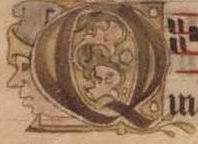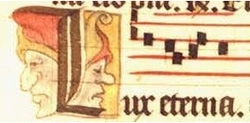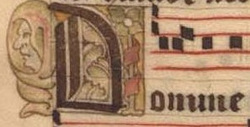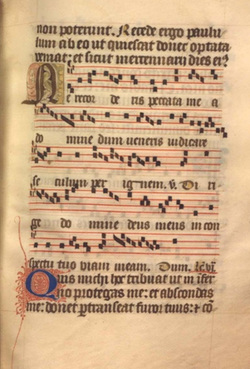Faces in the Capitals by Paige Comer

The fine specimens of late medieval Books of Hours and a Roman Missal in the Loras College collections have a number of noteworthy artistic features. One of those features is the unique ornamentation of many initials within these books. An initial is a letter that begins and separates each major part in a text.[1] “These can range from the major decorated initials, constituting miniature paintings that often opened a manuscript, to the minor initials penned in red ink by the rubricator to highlight text and chapter headings.”[2] There are different kinds of initials: historical initials, anthropomorphic initials, and foliate initials. The historic initial will contain a figure, or group of figures, that relates to what is in the text. The anthropomorphic initial is a decorated initial that is made from a human figure. Foliate Initials are decorated with floral designs, and zoomorphic initials are formed as animals, real or imaginary.
[1] http://www.newyorkcarver.com/scriptoria2.htm
[2] http://www.newyorkcarver.com/scriptoria2.htm
[1] http://www.newyorkcarver.com/scriptoria2.htm
[2] http://www.newyorkcarver.com/scriptoria2.htm

These initials can often relate to the texts in many ways, “they represent the author, owner, donor or patron; in other instances, they are used to articulate the text, making it easier for readers to find their way around the book; and often the images comment on the text in some way, sometimes acting as a visual commentary on its content or on the circumstances in which it was produced, or in which it might be used.”[1]
[1] http://www.bl.uk/learning/histcitizen/medieval/musicartlit/musicartliterature.html
[1] http://www.bl.uk/learning/histcitizen/medieval/musicartlit/musicartliterature.html

In the Roman Missal, many of these initials are anthropomorphic, having faces and people in them. One of the initials is decorated in yellow, red, green, and shades of brown. The art is decorating the letter D, having a face on the left side of the initial. The face looks as if it is wrapped inside a scarf and is facing towards the edge of the page. There is also a flower decorating the right side of the initial, wrapped in a red ribbon. The face with the initial could be symbolizing the composer of the music or the person for which the music was written. Since I am not sure what the words with the music mean, I am only able to make assumptions. Another initial similar to this one is the letter Q. On the left side of this initial is a face that is also facing toward the edge of the page and is wearing a hat with a yellow rim and a blue top. There are leaves inside the Q that are green and an off-white color. There is an L that has two faces, both facing away from the letter.

The faces look very similar, both wearing hats that are red and yellow color. One of the hats has a yellow rim and red top, where the other face hat has the colors switched. One common feature in many of these initials is that faces seemed to be shaped with the letter. The shape of the face with the D seems to be mirroring the shape of the D, similarly to the way that the face does with the rest of the letters.
In the French Book of Hours and Roman Missal there are many kinds of initials, but the most decorative are what is called a foliate initial, having flowers and plants within them. Many of these more elaborate initials are set in gold, with the letters decorated with floral in green, blue, and pink. Many intricate styles of foliage, ropework, geometric designs and flowers in gold and colors with elaborate interlaced ornamental gold borders the pages around the initials and text on the page. Other pages have some more simple initials that are colored in red and blue and are very common in books like this.

